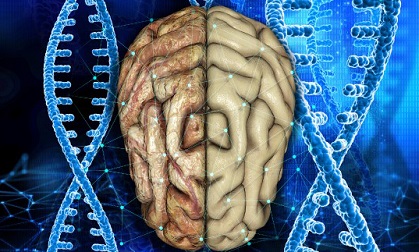Nikhil Prasad Fact checked by:Thailand Medical News Team Mar 15, 2024 1 year, 1 month, 2 days, 21 hours, 58 minutes ago
COVID-19 News: The coronavirus disease 2019 (COVID-19) caused by the severe acute respiratory syndrome coronavirus 2 (SARS-CoV-2) has not only posed significant challenges to global public health but has also been associated with various long-term effects, including cognitive decline. Understanding the molecular mechanisms underlying COVID-19-related cognitive impairment is crucial for developing targeted therapeutic interventions and improving patient outcomes.
 Role Of MicroRNAs In Cognitive Decline Associated With COVID-19
Role Of MicroRNAs In Cognitive Decline Associated With COVID-19
Thailand Medical News had already covered numerous studies in our past
COVID-19 News coverages validating that SARS-CoV-2 infections causes cognitive issues:
https://www.thailandmedical.news/news/great-news-university-of-oxford-study-shows-that-even-mild-sars-cov-2-infections-can-result-in-brain-changes-and-cognitive-decline
https://www.thailandmedical.news/news/post-covid-study-reports-concerning-findings-of-cognitive-deficits-among-many-recovered-covid-19-patients
https://www.thailandmedical.news/news/icahn-study-shows-that-cognitive-decline-and-brain-fog-can-persist-up-to-8-months-after-contracting-covid-19-and-the-scale-is-astounding
https://www.thailandmedical.news/news/university-of-california-study-warns-that-even-mild-sars-cov-2-infections-will-result-in-abnormalities-in-cerebrospinal-fluid-and-also-cognitive-issue
https://www.thailandmedical.news/news/university-of-california-researchers-warn-that-covid-19-induced-vascular-dysfunctions-contribute-to-long-covid-cognitive-deficits
https://www.thailandmedical.news/news/breaking-u-s-study-shows-that-even-mild-sars-cov-2-infections-lead-to-brain-inflammation,-brain-damage-and-also-cognitive-issues
line-in-those-aged-50-and-above">https://www.thailandmedical.news/news/chinese-researchers-warn-that-omicron-variants-and-sub-lineages-like-ba-2-2-1-can-cause-cognitive-decline-in-those-aged-50-and-above
https://www.thailandmedical.news/news/research-reveals-alarming-link-between-covid-19-and-memory-loss
https://www.thailandmedical.news/news/washington-university-study-shows-sars-cov-2-infections-increases-risk-of-various-neurological-issues-including-strokes-cognitive-disorders-and-enceph
https://www.thailandmedical.news/news/scientist-from-brazil-find-that-sars-cov-2-spike-proteins-causes-memory-loss
https://www.thailandmedical.news/news/thailand-medical-university-of-phayao-researchers-find-that-cognitive-function-and-physical-performance-of-youths-exposed-to-sars-cov-2-are-lowered
https://www.thailandmedical.news/news/alarmingly-many-non-hospitalized-covid-19-patients-will-exhibit-brain-fog-for-weeks-or-months-after-infection-according-to-university-of-oxford-study
https://www.thailandmedical.news/news/breaking-harvard-medical-school-study-alarmingly-finds-that-recovered-patients-of-severe-covid-19-undergo-premature-aging
https://www.thailandmedical.news/news/covid-19-cognitive-deficits-likely-caused-by-impairment-of-neurovascular-coupling
https://www.thailandmedical.news/news/harvard-study-finds-that-cognition-associated-long-noncoding-rnas-are-dysregulated-upon-severe-covid-19
https://www.thailandmedical.news/news/dementia-epidemic-in-india-17-6-percent-of-indians-aged-over-60-have-dementia-and-neurocognitive-disorders
https://www.thailandmedical.news/news/a-first-in-medical-history-john-hopkins-study-finds-that-sars-cov-2-causes-megakaryocyte-cells-to-be-found-in-brain-cells-resulting-in-covid-brain-fog
https://www.thailandmedical.news/news/neuro-covid-university-of-michigan-academic-warns-of-potential-memory-loss-and-dementia-in-covid-19-patients
https://www.thailandmedical.news/news/another-study-findings-adds-to-the-increasing-evidence-that-sars-cov-2-infection-increases-risk-of-brain-degeneration-that-will-lead-to-parkinson-s-di
https://www.thailandmedical.news/news/illinois-study-finds-that-caveolin-1-mediates-blood-brain-barrier-permeability-neuroinflammation-and-cognitive-impairment-in-covid-19
https://www.thailandmedical.news/news/breaking-new-study-from-brazil-shows-cognitive-impairment-in-long-covid-is-caused-by-sars-cov-2-spike-protein-inducing-long-term-tlr4-mediated-synapse
COVID-19 and Cognitive Decline: An Overview
COVID-19 is a multi-organ disease with diverse clinical manifestations, including neurological symptoms. Recent studies have reported cognitive dysfunction in a significant proportion of COVID-19 patients, even after recovery from the acute phase of the infection. This cognitive decline, often referred to as "COVID-19 brain fog," encompasses symptoms such as memory impairment, attention deficits, and executive function disturbances. The severity and persistence of these cognitive symptoms vary among individuals, raising questions about the long-term implications of COVID-19 on cognitive health.
Potential Mechanisms of COVID-19-Related Cognitive Decline
Several hypotheses have been proposed to elucidate the mechanisms linking COVID-19 to cognitive impairment. These include:
-Systemic Inflammatory Response: COVID-19 can trigger a robust inflammatory response, characterized by cytokine release and immune dysregulation. Chronic inflammation has been implicated in neurodegenerative processes and cognitive decline.
-Direct Brain Infection: SARS-CoV-2 may invade the central nervous system (CNS), leading to neuronal damage, neuroinflammation, and synaptic dysfunction, all of which contribute to cognitive impairment.
-Hypoxia and Microvascular Damage: COVID-19-associated respiratory distress can result in hypoxia, compromising cerebral perfusion and disrupting the blood-brain barrier, thus affecting cognitive function.
-Autoimmune Cascade: The immune response triggered by COVID-19 may lead to autoimmune reactions targeting neural tissues, contributing to cognitive dysfunction.
-Peripheral Organ Dysfunction: COVID-19 can impact peripheral organs, such as the lungs and heart, which in turn may affect brain health through systemic pathways.
MicroRNAs as Biomarkers and Mediators of Cognitive Decline in COVID-19
MicroRNAs (miRNAs) are small non-coding RNAs that play crucial roles in post-transcriptional gene regulation. Dysregulated miRNA expression has been implicated in various diseases, including neurodegenerative disorders. In the context of COVID-19-related cognitive decline, specific miRNAs have emerged as potential biomarkers and mediators of pathological processes:
-miR-146a: This miRNA exhibits neuroprotective effects and regulates inflammatory pathways. Reduced levels of miR-146a have been associated with neuroinflammation and cognitive impairment in Alzheimer's disease (AD) and may play a similar role in COVID-19-related cognitive decline.
-miR-155: Known for its role in modulating inflammatory responses, miR-155 has been linked to synaptic dysfunction and cognitive decline in various neurological conditions. Elevated miR-155 levels have been reported in COVID-19 patients, highlighting its potential as a biomarker for disease severity and cognitive outcomes.
-Let-7b: Upregulation of Let-7b has been observed in COVID-19 patients and is associated with immune dysregulation and cognitive dysfunction. Let-7b dysregulation may contribute to the pathogenesis of cognitive decline following SARS-CoV-2 infection.
-miR-31: Lower levels of miR-31 have been linked to cognitive impairment and neurodegeneration. In COVID-19, decreased miR-31 expression may exacerbate cognitive dysfunction through mechanisms involving neuroinflammation and coagulation abnormalities.
-miR-21: This miRNA has anti-inflammatory properties and plays a role in neuroprotection. Dysregulation of miR-21 has been implicated in COVID-19-related systemic inflammation and may contribute to neurodegenerative processes underlying cognitive decline.
Future Directions and Clinical Implications
Further research is needed to elucidate the specific roles of miRNAs in COVID-19-related cognitive decline and their potential as diagnostic biomarkers and therapeutic targets. Longitudinal studies assessing miRNA profiles in COVID-19 patients with cognitive impairment are warranted to establish causal relationships and identify prognostic indicators.
The integration of miRNA-based diagnostics and therapeutics into clinical practice holds promise for personalized management strategies and improved outcomes for COVID-19 patients at risk of cognitive decline. Collaborative efforts between researchers, clinicians, and industry stakeholders are essential to accelerate progress in this rapidly evolving field and address the unmet needs of patients affected by COVID-19-related neurological complications.
Conclusion
The interplay between COVID-19 infection and cognitive decline is complex and multifaceted, involving diverse molecular pathways and mechanisms. MiRNAs represent promising biomarkers and mediators of these pathological processes, offering insights into disease progression and potential therapeutic interventions. Continued research and innovation in miRNA-based diagnostics and therapeutics are essential for advancing our understanding of COVID-19-related cognitive impairment and enhancing patient care in the post-pandemic era.
The study findings by researchers from Kapodistrian University of Athens--Greece, General University Hospital of Larissa-Greece, Laiko General Hospital-Greece, Sismanogleio Hospital-Greece and University of Crete-Greece were published in the peer reviewed journal: Experimental and Therapeutic Medicine (Spandios).
https://www.spandidos-publications.com/10.3892/etm.2024.12427
For the latest
COVID-19 News, keep on logging to Thailand Medical News.
Read Also:
https://www.thailandmedical.news/news/breaking-long-covid-19-news-u-s-study-reveals-that-sars-cov-2-infections-can-lead-to-prosopagnosia-or-face-blindness
